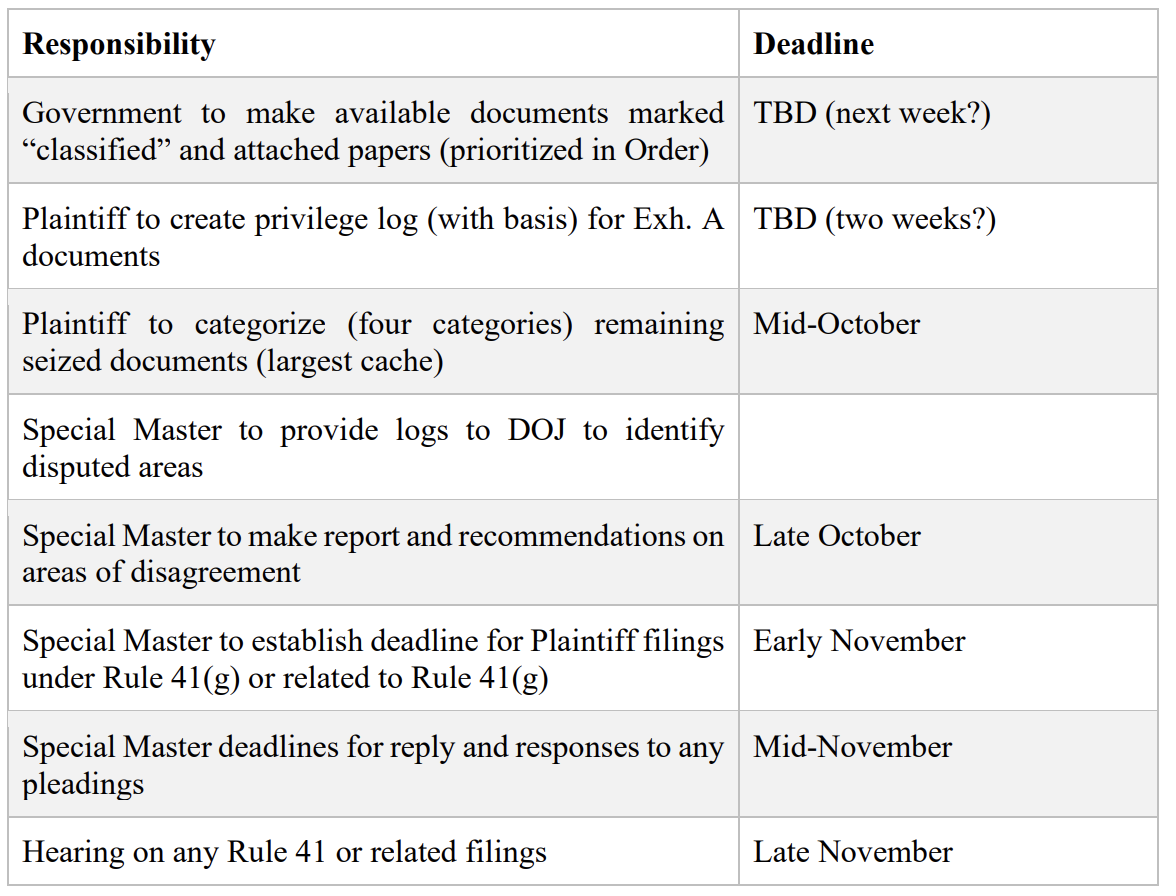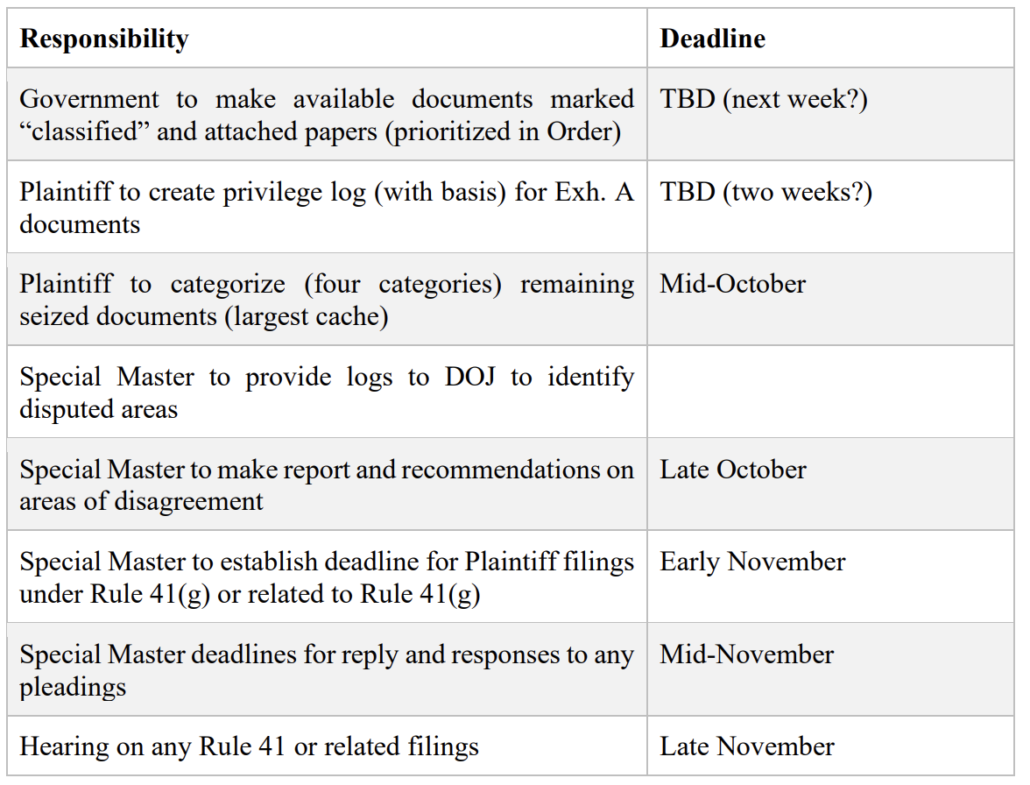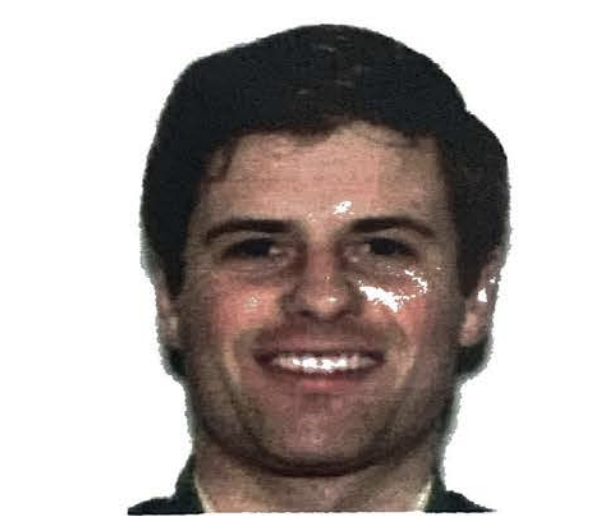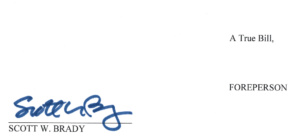John Durham’s Last Word: An Outright Lie about the Mueller Conclusions
There were aspects of Igor Danchenko attorney Stuart Sears’ closing argument yesterday that could have been stronger.
He could have more strongly emphasized that Danchenko had nothing to do with the words that appear in the dossier, and so when John Durham claims that the words in the dossier — alleging a conspiracy between Trump and Russia — are what Danchenko told the FBI he told Steele, he’s lying. Or maybe too stupid to understand that? That said, Sears did emphasize that Danchenko told the FBI the anonymous caller had said there was nothing bad about the ties between Russia and Trump.
It’s entirely possible it wasn’t Sergei Millian, but even if it was, the caller only said there was coordination between the campaign and Russia and that there was nothing bad about it. Agent Helson told you that. That’s not anti-Trump, and we do know from the government’s own evidence that Millian was at least telling people he was going to meet with Trump campaign people the week before the phone call, the anonymous phone call.
Still, this case is about reported speech, and Durham is prosecuting Danchenko for what the record shows is Christopher Steele’s speech, not for what the record shows is Danchenko’s speech.
Sears’ materiality argument could have been more forceful (though he correctly noted, jurors should never even have to get that far). Durham claims the alleged lies about Millian were material because they caused the surveillance against Carter Page; that is literally impossible for two of the alleged lies (which were told after surveillance stopped), including the October 24 alleged lie that, for the reasons I’ve laid out here, the jury may have more reason to believe Danchenko lied. And whether Danchenko told the FBI what Durham believes to be the truth — that no call with Millian happened — or Danchenko told them what he did — that the call that happened was so sketchy it shouldn’t have been relied on, and it did not include any claim of conspiracy — the decision the FBI should have taken would have been the same, to stop relying on that allegation in the FISA application. Importantly, Danchenko raised questions about the reliability of the call with no knowledge of the FISA application or the import of the conspiracy of cooperation language to the FISA application, but nevertheless told FBI everything they would need to remove the allegation from the FISA application.
And I think Sears could have hit the significance of the mobile apps harder. He did remind jurors about how Durham attempted to elicit false testimony about whether Danchenko had said this could be a mobile app.
The government set out to prove — Mr. Keilty told you in his opening statement he was going to prove Mr. Danchenko never received an anonymous call. Now, this is where — if you recall during the trial, special counsel got a little tricky here. Remember, they asked Agent Auten to refresh his recollection by reviewing a document, a report he had written, that Mr. Danchenko claimed to have received a cellular call from an anonymous caller. That was all they had him review. Just read that part, and what does it say? A cellular call, a cellular phone.
Then Mr. Onorato got up on cross-examination and literally said: Review the same report but read the rest of the sentence onto the next page.
And the full sentence that Agent Auten actually read out loud read: The call was either a cellular phone, or it was a communication through a phone app.
It was a good try, but it didn’t work. And it was a try because they know they have no evidence at all from which you could conclude there was not a call through a messaging app. They don’t have it. It’s their burden. They don’t have it. He doesn’t have to prove he received a call on a messaging app. They have to prove he didn’t.
Sears had more evidence here, though. There was the evidence that Millian was communicating via mobile apps using his iPad in the period he was in South Korea (though Durham worked hard to withhold it from the jury), and because he was overseas, Millian would be far more likely to use mobile apps than telephony. It might have been useful to explain why Ryan James’ effort to rule out a mobile app call by looking at only telephony calls didn’t even attempt steps that could have clarified the issue. The steps Durham’s hand-picked FBI agent failed to take prove, definitively, that Durham never attempted to fill what Sears called “a giant hole” in Durham’s case.
And if they have not convinced you beyond a reasonable doubt that he did not receive an anonymous call through a phone app, that’s the end of the case. They had to prove that.
They told you they would, but did they? Are you convinced beyond a reasonable doubt, as you sit here today, that Millian or perhaps someone else didn’t reach out to him anonymously over a messaging app in July 2016? What evidence do you have to make that conclusion? What evidence do you have to make that conclusion beyond a reasonable doubt? There’s none. It’s a giant hole in the case, and they can’t fill it with conjecture, speculation, and argument. Where is the evidence?
All that said, Sears laid out all the other compelling proof against Durham: that Durham’s own witnesses, Brian Auten and Kevin Helson, said Danchenko didn’t lie, and that all the details that Durham collected believing they would disprove Danchenko’s story in fact corroborated the claims Danchenko had made about the call and aftermath.
We’ll learn soon enough what the jury thinks about it. They deliberated for about three and a half hours yesterday and will resume deliberations at 9:30 this morning.
I’d like to address the underlying dynamic about the closing arguments, though.
Michael Keilty, the least corrupt member of the Durham team, had the initial close, which often is the longer of prosecutors’ two presentations, the one in which prosecutors explain to the jury which the most important pieces of evidence are and where to find them. At least by transcript pages, that wasn’t the case here: Keilty’s close spanned 21 pages, whereas Durham’s rebuttal spanned 22. Still, that’s totally within the norm, and how the prosecution splits their time is their own decision.
But that time differential is not what Judge Anthony Trenga expected. Even before Durham started, he remarked on how short Keilty’s close was and asked Durham in a bench conference how long he expected to take.
THE COURT: I thought the government’s closing was going to be a lot longer than it was. How long were you intending for rebuttal?
MR. DURHAM: I would say half an hour, 40 minutes.
THE COURT: Well, I’ll give you half an hour. All right.
MR. DURHAM: Yes, Your Honor.
I think Trenga suspected — as did I after Keilty’s close — that the entire plan from the start was to sandbag Danchenko’s team, effectively present the bulk of the close after Sears could no longer respond (this is what Durham did with Special Agent Kevin Helson’s testimony, raising the most damning testimony of the trial for the first time in a second redirect).
Sears anticipated that would happen. Based on all the times Durham pointed to evidence he didn’t have because he himself didn’t bother to try to collect it, Sears warned the jury about the Special Prosecutor’s efforts to shift the burden on Danchenko, repeatedly demanding that Danchenko affirmatively prove his claims, rather than just disprove Durham’s.
So now is the part where I have to sit down in a minute, and it’s the hardest part of the case for a defense attorney because they get the last word. And so we just have to sit there and listen and think about the things we meant to say when we were up here and forgot or the things that we think they’re getting wrong and that we feel like we can correct, like I was just able to do now, and we can’t.
And it’s particularly concerning in this case and difficult in this case because the burden shifting I heard in the government’s closing about where is the evidence that Mr. Danchenko did this or did that. He didn’t have any burden. You’re not going to see an instruction back there that says he has a burden to do anything. It’s the government’s burden to prove their case. It’s not his burden to disprove it.
The special counsel at times through its questions and arguments, they’ve not given you the full picture. They haven’t told you the whole story. Just like when they were showing the agents and had the agents testifying, well, if you knew this or if you knew that, what would you think? Oh, yeah, that would affect my views of that, or I would think that was important. They only showed them the stuff that they think helped their case.
[snip]
So I’m worried more so than usual when I go back to sit down about what you’re going to hear now and what I can’t respond to. And while I can’t do that, you can. You can pay attention to what’s said now, and you can discover those inaccuracies or misstatements, if there are any, when you go back to deliberate and consider the actual evidence in this case.
Before he did this, though, Sears talked about how Bill Barr started this investigation, burned Danchenko as a source, and how as part of the investigation Barr set up, Durham has not investigated what happened, but instead set out to prove guilt.
Agent Helson also told you that Mr. Danchenko’s information was vital to national security and led to the opening of more than two dozen active influence cases. He became a trusted source of information for our government that even led to the creation of a new team at the FBI as a result of the information he provided, the guy they are saying is a liar.
But as you’ve also heard at trial, the political winds in this country changed once then-President Trump appointed a new attorney general, William Barr. Barr not only essentially revealed Mr. Danchenko’s identity by releasing a redacted version of his January 2017 interview to the Senate Judiciary Committee, but that committee released that report within an hour of receiving it to the public.
Attorney General Barr also ordered an investigation into the investigation of the Trump campaign and its connections to Russia. So a new special counsel was appointed, this special counsel, to lead that investigation.
I submit to you that if this trial has proven anything, it’s that the special counsel’s investigation was focused on proving crimes at any cost as opposed to investigating whether any occurred.
I submit to you that a fair and reasonable look at the evidence in this case shows that the special counsel — they started out with the presumption of guilt, that Mr. Danchenko had lied, and they read guilt into every piece of evidence they came across and at every detail they saw. They ignored — and we’re going to show you. They ignored how their own evidence showed he was not guilty, that he was innocent.
This narrative is all true. Even within the trial, there was abundant evidence presented that Durham sought out to find someone to charge, not to find out what happened (neither of which is an appropriate use of prosecutorial resources, absent evidence of a crime).
For any critique I have about things Sears could have done tactically, the strategic decision to make Durham defend his own investigation clearly had an effect. I think Sear’s comments got to Durham, and made him defensive.
In his close, in the middle of spending much of his close focusing on a single 2020 LinkedIn message in which Danchenko admitted he was the source for 80% of the raw intelligence in the dossier, John Durham took the time to rebut the accusation about Bill Barr deliberately exposing Danchenko by blaming Danchenko for speaking to the press.
But what do you also know about that? And don’t forget what the evidence is. Mr. Sears wants to put this on Bill Barr. He wants to put it on politicians or whatever. You heard testimony from Mr. Helson that Mr. Danchenko himself, when he was interviewed by the press — all right. I think it was couched in the terms of your recollection controls, of course, but I think it’s couched in terms of, well, he had to do what he had to do to protect himself. He went and talked to the press.
And then later in his close, he returned to it again, not presenting the proof that Sears said was absent, but instead defending Bill Barr.
That’s when Durham decided to explain to the jury what he believes the results of the Mueller investigation were.
Now, I think that counsel’s suggestion is, oh, it’s Bill Barr. Bill Barr did this for political reasons. But reflect on how this came about. The Mueller report had come out, and there’s no collusion that was established. It’s not an illogical question to ask, well, then how did this all get started? Now, you can call that political. You can suggest, I guess, inferentially that somehow people who have spent a considerable period of time away from their families and whatnot did this for political reasons or what have you. If that’s your mind-set, I suppose that’s your mind-set.
But to look into the question of how did this all happen — Director Mueller, a patriotic American, the former director of the FBI, concludes there’s no evidence of collusion here or conspiracy. Is it the wrong question to ask, well, then how did this get started? Respectfully, that’s not the case. [my emphasis]
That’s the first time when Judge Trenga interrupted and told Durham to wrap it up.
THE COURT: You should finish up, Mr. Durham.
MR. DURHAM: Yes, Your Honor.
Only after Trenga told him to stop and only after defending Billy Barr twice did Durham turn to the crucial issue before him, attempting to disprove a mobile app call.
You know that the defendant didn’t receive an anonymous call here on an app from Millian or anyone else for at least three reasons:
First, there’s absolutely no evidence in the record of such a call, none.
Second, the statements the defendant made to the FBI are not in any way consistent with how someone would describe an anonymous call. They’re consistent with how somebody would describe a call that they made up.
Even though Danchenko was a trained business intelligence analyst whose entire task from orders from Christopher Steele was to find evidence of collusion between Trump and the Russians — if he had received an anonymous call, whether he thought it was Millian or it was somebody else, that would be the very evidence of collusion that he was looking for so eagerly. As a trained researcher, he clearly would have noted every detail possible: What’s the incoming call number? What’s the area code number? What other details are there? What do you know about the person’s speech pattern? None of that information is recorded or provided. It’s simply an anonymous caller.
He would have known to remember the cell phone application if it was a cell phone application that was involved. Look, that’s what a good research analyst does, looks into the details, records those details, and reports on those details. Mr. Danchenko did none of that. He didn’t provide any of that information to Steele, and he didn’t provide any of that information to the FBI.
Third, the most conclusive evidence that such a call never occurred, if you look at Government’s Exhibit 207T, the defendant’s August 18 email to Mr. Millian where the defendant states in his own words — I mean, he can’t get away from his own words. His words state that he wrote to Millian several weeks earlier and that they were contacts on LinkedIn but says nothing about the call that he told the FBI he thought was probably Millian. What possible reason could explain why the defendant wouldn’t at least ask Millian if he had called?
Because he had spent his time doing other things, including defending Bill Barr twice, in the middle of walking the jury through what Durham believes is his smoking gun evidence, he made a bid for more time.
I want you to look at Government’s Exhibit 115T, the August 24 email — Can I have five more minutes, Your Honor?
THE COURT: One minute.
MR. DURHAM: One minute.
The point being, I think (and Trenga may have thought) that Durham attempted to sandbag Danchenko, delaying the entirety of his substantive close until after Sears had finished.
And indeed, Durham’s presentation of what they believe is their smoking gun evidence didn’t come until Durham’s own close, not Keilty’s.
An attempted sandbag.
Though it only came after Durham spent his time trying to defend Barr’s actions, not just in exposing an FBI source, but in launching this investigation in the first place.
Which is why it matters that Durham lied about the conclusion of the Mueller investigation when he claimed, “Director Mueller, a patriotic American, the former director of the FBI, concludes there’s no evidence of collusion here or conspiracy.”
Mueller didn’t charge conspiracy and it is true that he said the available evidence did not prove it (in at least two cases, notably, because people had destroyed mobile app communications). But even ignoring the then-ongoing investigation into whether Roger Stone conspired to hack with Russia, Mueller explicitly stated that, “A statement that the investigation did not establish particular facts” — such as the finding that, “the investigation did not establish that members of the Trump Campaign conspired or coordinated with the Russian government in its election interference activities” — “does not mean there was no evidence of those facts.”
Mueller pointedly said his statement explaining that he didn’t charge conspiracy doesn’t mean there is no evidence of conspiracy, but John Durham got up before a jury and asserted that anyway. To defend his actions spending almost twice as long hunting for guilt as Mueller did investigating Trump aides for their potential role in a crime, Durham affirmatively claimed what Mueller said one could not claim.
All the more so given that (as Onorato had already established), three of the first four subjects of the investigation were convicted, and five of those convicted — Mike Flynn, George Papadopoulos, Michael Cohen, Paul Manafort, and Roger Stone — were either convicted or (in the case of Manafort) found by a judge to have lied to cover up their interactions with agents of Russia in 2016.
Indeed, Brittain Shaw even explicitly used the standard on which the FBI first opened the investigation — to figure out whether claims like the ones George Papadopoulos made to Australia were true or not — in her attempt to prove the materiality of the literally true alleged lie Durham prosecuted Danchenko for.
With respect to knowing whether someone passed false information that contained allegations — not the Lewandowski part but somebody made up that they were an insider or had inside information, in the course of looking at Russian interference, as you did in the Special Counsel’s investigation, would that have been important to you?
In their bid to win this case, Durham and his prosecutors have argued not only that one can investigate whether someone is telling the truth when he claims to have inside access to Trump (as evidence in this trial showed Millian was doing), much less to Russia, as Papadopoulos was doing. Indeed, in his attacks on the FBI, Durham claimed one would be negligent not to investigate such things. Durham even argued that Mueller didn’t investigate Sergei Millian thoroughly enough.
And yet, when it came time to prove his own case, to explain why he hadn’t taken basic steps to disprove a mobile app call, Durham instead squandered his time inventing false claims about the results of the Mueller investigation.
We’ll see what the jury has to say about Durham’s defense of his prosecution. But there is no more fitting way for Durham to end this fiasco than to lie about how and why it all got started in the first place.
Update: Changed how long the jury has deliberated to include their lunch.













